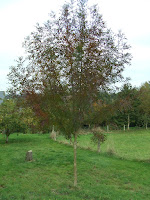We have had four weeks at our house in France, now drawing to a close. It has been very hot and dry at times, but fortunately rain arrived in time to rescue the smaller plants from death by desiccation. We have been hedging - chopping off the top and sides of a tall, thick Leylandii hedge surrounding our kitchen garden on two sides. It's hot, dirty work on top of a platform with loppers and various heavy and business-like telescopic electric implements.
The usual mowing, weeding, cutting back and clearing has gone on too, and we have burnt vast mounds of hedge-clippings and assorted rubbish - four times! I also got very hot and sticky hacking back ferns and brambles which were choking our dogwoods and extending out over the lane at the top of the garden. Because I was on a public road and our dog likes to be around us, we shut her in for her safety. But someone left a door not quite shut, she escaped and appeared in the garden, looking very pleased with herself!
This summer we have been infested with moles. We always have them and normally simply ignore them and live alongside. But this year they have been nothing less than rampant. We work hard trying to keep our acre tidy and beautiful, and molehills (taupinieres) across the lawn and under my little shrubs, with new ones appearing every morning, were making an unsightly and potentially damaging mess. So my husband did some research on the internet and found that the best trap for a marauding mole is something called a 'putange', known to mole-trappers everywhere as 300-year-old French rural technology and the best thing for the job. However, despite repeated efforts for a fortnight he caught nothing at all. Neither of us is keen on killing things, and normally tolerate anything that shows up (although I was rather dismayed to find one of my small hydrangeas ripped apart, we think by a hare, which had also debarked some of the smaller trees.) We understood that a humane trap is really not something to be used on moles; such a trap would need to be checked with unrealistic frequency if the poor creature was not to die of starvation or stress - a far crueller death than the swift one meted out by a successful 'putange.'
We consulted our French neighbours who, of course, knew of a professional mole-trapper, one Fernand. In due course Fernand turned up in his blue van, full of 'putanges' and other tools of the trade. He looked all round our garden, working out where the runs were as if he had X-ray eyes. He came again the next day, and the next, and caught 3 moles. The fourth day he came to collect his traps and be paid, and we noted that for a while mole activity decreased markedly. Since then, unfortunately, we have noticed more molehills, so my husband, who watched Fernand with keen interest, is back to laying traps.

A more welcome visitor was the owl - our owl or another, we don't know. The first few evenings we were here I thought I saw one on two occasions, but I wasn't certain - they fly so fast. Then, early one morning I was out with the dog near the small outbuilding where we put the owl house last summer. I heard a thump and out from the building came a barn owl, quite unmistakable. It flew away over the garden and I haven't seen it since. I guess it was roosting here in our absence, and once we were about decided to decamp elsewhere.



I have been reminded as we drove about on various errands just how fertile this part of France is. Hay bales have now been collected, leaving the fields stripped and golden. Maize stands tall, but it will be taller still when it is harvested in October, to be stored as winter feed for cattle. Once it is cut the views of the countryside open up again. Market stalls are loaded with produce, much of it local, and the summer fruits are sumptuous and colourful - nectarines, apricots, melons. We are fortunate to be part of this bounty.




Another aspect of the summer in rural France is the town's or village's annual festival, and this year we spent a hot afternoon with crowds in holiday mood at one such in a nearby town, a 'Corso fleuri' in which slow-moving floats are decorated with thousands of paper flowers, each about as big as my thumbnail. The whole tableau depicts some aspect of local interest, including a Viking longship, dairy products and, of course, the local beauty queens. The town was also replete with real flowers - on every bridge, lamp post and balcony. It must have taken many people many weeks of preparation and the colours were dazzling. For my husband, however, the biggest attraction was the town band
(called, wittily, 'Elefanfare') which, as we expected, included two sousaphones - one decorated as a blue elephant!

 Spiraea
Spiraea















































